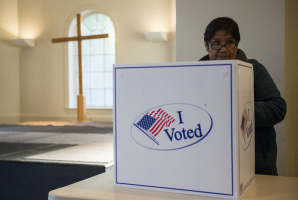Author: Hundreds of thousands of evangelicals sat out election due to Trump’s tweets, ‘character problems’

A prominent author is suggesting that questions about President Donald Trump’s character and Twitter habits caused a small but not insignificant slice of evangelicals not to vote for him in 2020, a collective decision that may end up denying him a second term.
Joel Rosenberg, bestselling author and the founder of All Israel News, shared the results of exit polling conducted by McLaughlin & Associates on behalf of his website Thursday, two days before several media outlets called the 2020 presidential election for Biden. The exit polling shows that Trump received the support of 79.4% of white evangelicals, a drop from his support among the demographic from four years ago, which Pew Research pegged at 81%.
The 2020 exit polling also found that Trump’s opponent, former vice president Joe Biden, received 18.6% support among evangelicals, a 2.6% increase from Democrat nominee Hillary Clinton’s performance in 2016.
“If Trump ends up losing his re-election bid – and that is far from clear, but certainly possible – his trouble with a small but important percentage of Evangelicals could prove decisive,” Rosenberg wrote.
Results of the survey are based on responses from 1,000 voters with a margin of error of +/-3.1%.
Early exit polling data conducted for The Washington Post and other media outlets also found a drop in support for Trump among white evangelicals, with 76% voting for him and 23% voting for Biden.
Notably, another survey from the Faith & Freedom Coalition found that 81% of self-identified white evangelicals voted for Trump this year, while only 14% voted for Biden.
More than a week after Election Day, the definitive outcome of the race remains uncertain as the Trump campaign continues to contest the election results and look into allegations of voter fraud.
Rosenberg, who claimed to have interviewed evangelicals “all across the U.S.,” said many "could not look past what they regard as Trump’s character problems," including “‘mishandling’ of the COVID-19 pandemic, his ‘inflammatory’ tweets, his ‘disastrous’ and ‘distasteful’ first debate performance, his ‘unkindness’ towards his political rivals and opponents, his perceived ‘dishonesty’ on various topics, his ‘chaotic’ and ‘exhausting’ manner of governance, and his ‘weird’ photo-op in front of a church in Washington that had been burned by riots.”
Those detractors cited the aforementioned concerns as reasons why they did not vote for the president. “Some told me they were inclined to sit out the election. Others in recent months told me they were probably going to vote for Biden,” he added.
Rosenberg expanded on the impact that evangelical deflections from Trump may have had on the results of the 2020 presidential election in an interview with The Washington Examiner’s Paul Bedard. Rosenberg explained, “While the percentage lost by Trump may look small, it likely represented 720,000 voters. And in states such as Georgia where few votes separate Biden and Trump, it may have been the difference.”
“For more than a year, I and others have been warning that if President Trump lost just 1% of the evangelical Christians that he would likely lose White House. Why? There are 60 million evangelicals in the U.S. — 75% of them are white. That’s 45 million people,” Rosenberg told The Washington Examiner.
According to Rosenberg, “A loss of 1% would be losing 450,000 votes.” Referencing the All Israel News exit poll finding a 1.6% drop in support for Trump among evangelicals from 2016 to 2020, Rosenberg told Bedard that the decrease in support “translates into a potential loss of 720,000 voters.”
“In a close race, like this year, those votes could very well be the margin between victory and defeat.”
In 2016, Trump secured the White House by obtaining razor-thin margins of victory in three states that had not voted for a Republican presidential candidate in decades: Michigan, Wisconsin and Pennsylvania. That year, Trump won Michigan by less than 11,000 votes, Wisconsin by less than 23,000 votes and Pennsylvania by roughly 44,000 votes.
Four years later, the presidential election results have yet to be finalized. Based on the current, unofficial results compiled by Politico, Biden leads Trump by about 12,500 votes in Georgia, nearly 49,000 votes in Pennsylvania, and more than 20,000 votes in Wisconsin.



























